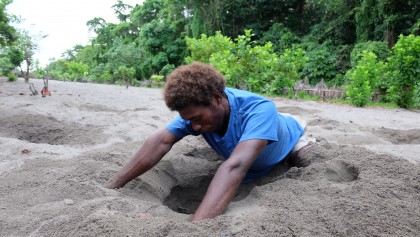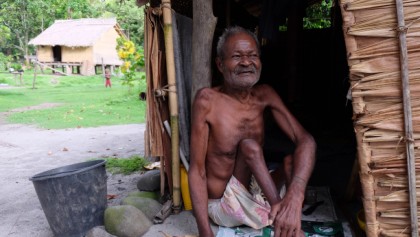The disappearing megapode birds of Savo Island
For chief Edwyn Kuki, it is simple.
As a boy growing up in Panueli Village, on the northern side of Savo Island in the Solomon Islands’ Central Province, megapode birds were everywhere.
These days, they’re not.
“In my day they came in the mornings, afternoons, and at night,” he told an SIBC team touring the volcanic island.
“And when I was a child we had too many eggs, there were eggs like there were pebbles on the beach. These days, they have to look forever to to find them.”
The Megapode birds have had a long history with Savo Island. According to chief Kuki and the stories told to him as a child, they have been on Savo “forever”.
They come here for one thing: the soil.
The black birds, which are about the size of a chicken, fly in and bury their eggs in the hot volcanic sand, sometimes more than 1.5m deep, to help with incubation.
There are a few spots around the Solomon Islands where the birds fly in, namely Simbo Island in the Western Province.
Some species of the megapode across the Pacific are endangered, and it looks as though Savo’s version of the bird could be headed that way, if not already.
Chief Kuki, whose village is home to the only cultivated megapode field left on the island, said he believed there was an obvious reason for the decline in numbers: the rules weren’t being followed.
“We (as children) weren’t allowed to enter the megapode field,” he told SIBC outside his hut. “If we did we’d get punished, severely.
“Now there are no more rules. The public can go in, and there aren’t as many eggs.
“We had seasons. For some months we wouldn’t let people in and harvest, then you’d dig a hole and find 40 eggs. Now, they go in everyday, there’s no rules. They dig and can’t find anything.”
The eggs are critical to the survival of the village. Panueli is one of the more attractive villages of Savo, and the megapode eggs have a lot to do with that.
The eggs, which are much bigger than a chicken egg and are about 80 per cent yoke, sell for $SBD10 at Honiara’s Central Market, or can be traded for one tin of tuna or four Tabacco rolls.
The search process for the eggs itself is fascinating. The birds come at dawn and sometimes at night – they used to come in the morning, afternoon and evening.
The men assigned to the digging look for tracks and soft sand. They then get on their hands and knees and start the excavation.
Sometimes they find eggs, sometimes – which is more common these days – they don’t.
When SIBC came just after dawn to try and spot the birds, none could be found. Instead we encountered the digging. On the morning we were there only five eggs were found.
They then rake and level out the soil, like an official raking the long jump pit at the Olympics, to try and encourage the birds back again – like nothing had happened.
Chief Chris Nivou, a younger big man from Panueli, said wild dogs have also been part of the problem.
And though it was not expressed specifically, SIBC understands the non-stop harvesting of the eggs is out of necessity: they need a constant source of income for survival.
It is also a major tourism attraction.
Chief Edwyn Kuki, who did not know his age, said the apparent demise of the megapode bird distressed him greatly.
“There are no more fields now (besides this one), it’s sad,” he said. “When I was young we all had fields.
“It can’t happen (the regeneration of the birds) it won’t happen. Maybe if children now paid more attention to their fathers.
“But there’s nothing I can say, there’s not much I can do. Who would listen to me? I’m just an old man with polio.”






